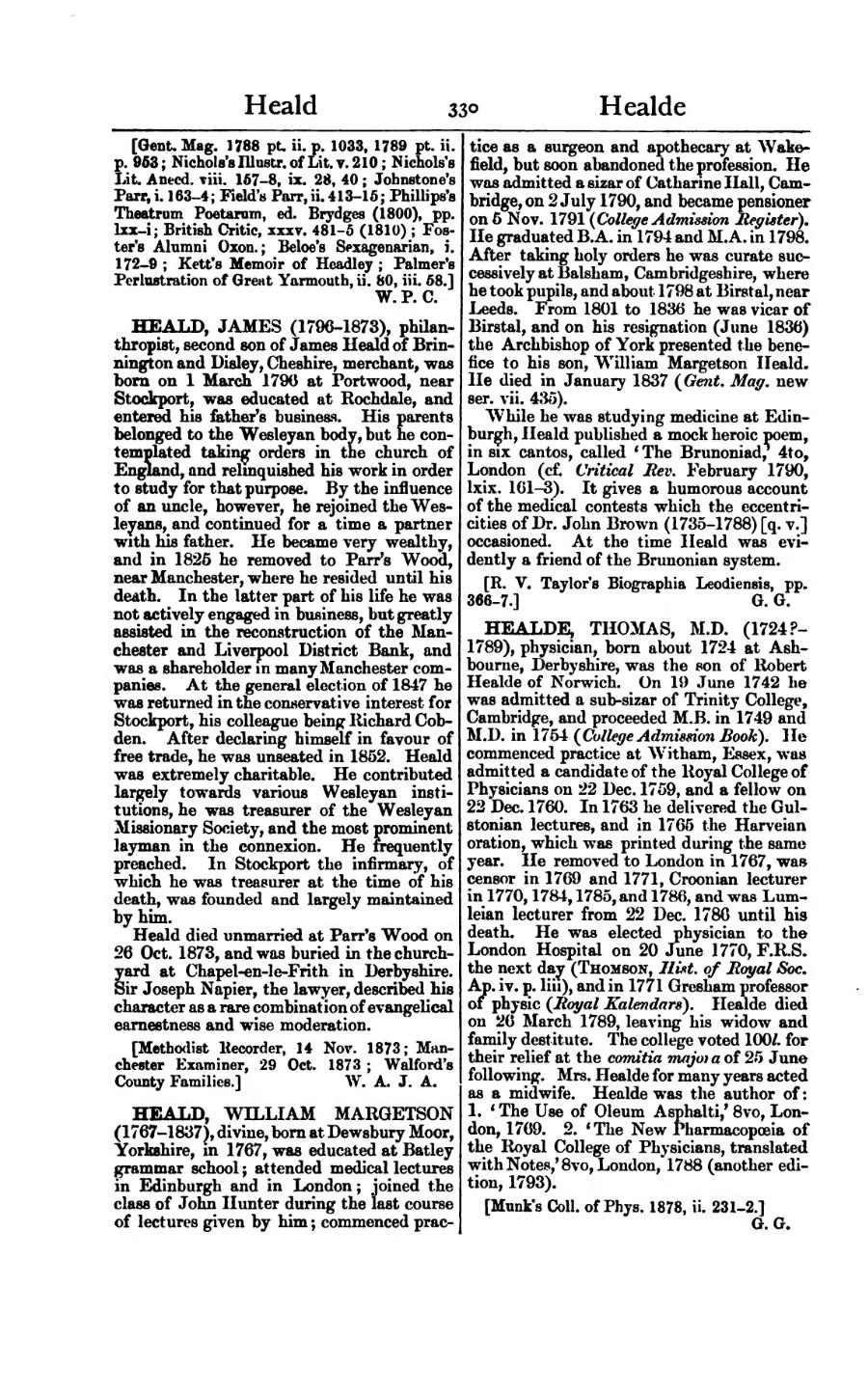[Gent. Mag. 1788 pt. ii. p. 1033, 1789 pt. ii. p. 953; Nichols's Illustr. of Lit. v. 210; Nichols's Lit. Anecd. viii. 157–8, ix. 28, 40; Johnstone's Parr, i. 163–4; Field's Parr, ii. 413–15; Phillips's Theatrum Poetarum, ed. Brydges (1800), pp. lxx–i; British Critic, xxxv. 481–5 (1810); Foster's Alumni Oxon.; Beloe's Sexagenarian, i. 172–9; Kett's Memoir of Headley; Palmer's Perlustration of Great Yarmouth, ii. 80, iii. 58.]
HEALD, JAMES (1796–1873), philanthropist, second son of James Heald of Brinnington and Disley, Cheshire, merchant, was born on 1 March 1796 at Portwood, near Stockport, was educated at Rochdale, and entered his father's business. His parents belonged to the Wesleyan body, but he contemplated taking orders in the church of England, and relinquished his work in order to study for that purpose. By the influence of an uncle, however, he rejoined the Wesleyans, and continued for a time a partner with his father. He became very wealthy, and in 1825 he removed to Parr's Wood, near Manchester, where he resided until his death. In the latter part of his life he was not actively engaged in business, but greatly assisted in the reconstruction of the Manchester and Liverpool District Bank, and was a shareholder in many Manchester companies. At the general election of 1847 he was returned in the conservative interest for Stockport, his colleague being Richard Cobden. After declaring himself in favour of free trade, he was unseated in 1852. Heald was extremely charitable. He contributed largely towards various Wesleyan institutions, he was treasurer of the Wesleyan Missionary Society, and the most prominent layman in the connexion. He frequently preached. In Stockport the infirmary, of which he was treasurer at the time of his death, was founded and largely maintained by him.
Heald died unmarried at Parr's Wood on 26 Oct. 1873, and was buried in the churchyard at Chapel-en-le-Frith in Derbyshire. Sir Joseph Napier, the lawyer, described his character as a rare combination of evangelical earnestness and wise moderation.
[Methodist Recorder, 14 Nov. 1873; Manchester Examiner, 29 Oct. 1873; Walford's County Families.]
HEALD, WILLIAM MARGETSON (1767–1837), divine, born at Dewsbury Moor, Yorkshire, in 1767, was educated at Batley grammar school; attended medical lectures in Edinburgh and in London; joined the class of John Hunter during the last course of lectures given by him; commenced practice as a surgeon and apothecary at Wakefield, but soon abandoned the profession. He was admitted a sizar of Catharine Hall, Cambridge, on 2 July 1790, and became pensioner on 5 Nov. 1791 (College Admission Register). He graduated B.A. in 1794 and M.A. in 1798. After taking holy orders he was curate successively at Balsham, Cambridgeshire, where he took pupils, and about 1798 at Birstal, near Leeds. From 1801 to 1836 he was vicar of Birstal, and on his resignation (June 1836) the Archbishop of York presented the benefice to his son, William Margetson Heald. He died in January 1837 (Gent. Mag. new ser. vii. 435).
While he was studying medicine at Edinburgh, Heald published a mock heroic poem, in six cantos, called ‘The Brunoniad,’ 4to, London (cf. Critical Rev. February 1790, lxix. 161–3). It gives a humorous account of the medical contests which the eccentricities of Dr. John Brown (1735–1788) [q. v.] occasioned. At the time Heald was evidently a friend of the Brunonian system.
[R. V. Taylor's Biographia Leodiensis, pp. 366–7.]
HEALDE, THOMAS, M.D. (1724?–1789), physician, born about 1724 at Ashbourne, Derbyshire, was the son of Robert Healde of Norwich. On 19 June 1742 he was admitted a sub-sizar of Trinity College, Cambridge, and proceeded M.B. in 1749 and M.D. in 1754 (College Admission Book). He commenced practice at Witham, Essex, was admitted a candidate of the Royal College of Physicians on 22 Dec. 1759, and a fellow on 22 Dec. 1760. In 1763 he delivered the Gulstonian lectures, and in 1765 the Harveian oration, which was printed during the same year. He removed to London in 1767, was censor in 1769 and 1771, Croonian lecturer in 1770, 1784, 1785, and 1786, and was Lumleian lecturer from 22 Dec. 1786 until his death. He was elected physician to the London Hospital on 20 June 1770, F.R.S. the next day (Thomson, Hist. of Royal Soc. Ap. iv. p. liii), and in 1771 Gresham professor of physic (Royal Kalendars). Healde died on 26 March 1789, leaving his widow and family destitute. The college voted 100l. for their relief at the comitia majora of 25 June following. Mrs. Healde for many years acted as a midwife. Healde was the author of: 1. ‘The Use of Oleum Asphalti,’ 8vo, London, 1769. 2. ‘The New Pharmacopœia of the Royal College of Physicians, translated with Notes,’ 8vo, London, 1788 (another edition, 1793).
[Munk's Coll. of Phys. 1878, ii. 231–2.]

